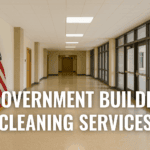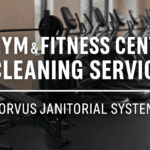It takes hard work and dedication to succeed as a business owner in any industry, and any experienced entrepreneur will tell you that choosing the right field can make all the difference. The good news is the commercial cleaning franchising industry has shown stability and promising opportunities for aspiring entrepreneurs and is one of the best low-cost franchises out there.
Whether you’ve been thinking about opening your own cleaning company for a while or are just beginning to weigh the pros and cons, questions like “where do I start?” and “how will I pay for this?” might be crossing your mind. That’s where franchise financing comes in.
From assessing start-up costs to evaluating creditworthiness and everything in between, the guide below will help you confidently navigate the financing process and be on your way to laying the foundation for a thriving cleaning company.
What is Franchising?
You’ve likely heard the word “franchise” or “franchising” said in everyday language, but what exactly does it mean?
Franchising is a business model in which a company (the franchisor) licenses its brand, products, and services to a third party (the franchisee) in exchange for an initial fee and ongoing royalties. The franchisee operates a business under the franchisor’s brand and receives support, training, and marketing assistance from the franchisor.
If the terminology listed above sounds like a foreign language, not to worry. Here is some basic franchising terminology broken down:
Franchise Fee: Franchisees typically have to pay an upfront franchise fee to the franchisor to acquire the right to use the business model and brand. The franchise fee can vary widely depending on the industry, the brand’s strength, and the size of the territory.
Royalties: Franchisees are required to pay ongoing royalties to the franchisor as a percentage of their gross sales. Royalties usually cover services such as ongoing training and support, marketing and advertising assistance, operational support, and product procurement.
Franchise Agreement: The franchise agreement is a legal contract between the franchisor and the franchisee that outlines the terms and conditions of the franchise arrangement, including the franchise fee, royalties, operational requirements, and other obligations.
Marketing and Advertising: Franchisees usually contribute a certain percentage of their sales to an advertising and marketing fund administered by the franchisor. This fund is used to develop regional or national advertising and marketing campaigns to promote the brand. Franchisees are also often asked to participate in local marketing campaigns.
With a franchise, a person can reap the benefits of business ownership without starting from scratch. This is especially attractive to aspiring entrepreneurs, however it’s important to take it upon oneself to do their own due diligence, like carefully reviewing the franchise agreement, understanding the fees and obligations, and thoroughly researching the franchisor and the market to assess the viability of the opportunity. The business landscape is ever changing and unpredictable challenges always arise.
Take the U.S. Small Business Administration’s (SBA) announcement, for example. Earlier this year the SBA declared that it would end its franchise directory. The SBA Directory was created as a way for lenders to check whether a franchise was eligible for SBA financing. Without it, SBA lenders will need to do more work to assess whether a franchise qualifies for agency loans. And entrepreneurs will have to do extra digging, too, as they weigh an investment.
Financing a Franchise
Once you’ve determined that franchising is the right business model for you it’s time to consider how you’ll pay for it. Perhaps you have the funds available (and good for you if that’s the case!), but if you’re like the majority of Americans you will need to examine alternative routes. There are several reasons why financing can be beneficial, such as:
Start-Up Costs: Financing can help cover the initial start-up costs of a cleaning business, such as purchasing cleaning equipment, supplies, and hiring staff. By securing funding, you can get your business up and running more quickly and efficiently.
Expansion and Growth: Financing can provide the necessary capital to expand your franchised cleaning business or offer additional services. This can help you reach new customers, increase revenues, and achieve business growth.
Equipment Costs: Cleaning businesses often rely on specialized equipment for efficient and effective service delivery. Financing can help you upgrade or replace equipment, ensuring that you have the latest tools and technology to meet client demands
Financing a cleaning business can feel like a daunting task, especially when you’re first starting out in business. If you’re not sure where to start, here are some factors all lenders may consider when discussing potential partnership opportunities:
Personal Credit: Your personal credit is a vital factor in securing financing for a franchise. Lenders review your personal credit history to determine your creditworthiness. Ensure your credit score is in good standing before seeking financing. If your credit score needs improvement, take steps to improve it, such as paying off loans or credit card balances.
Collateral: Collateral is an asset that a lender can seize in the event that you default on your loan or are unable to fulfill the repayment terms. Having collateral, such as property, equipment, or inventory, can increase your chances of securing financing. A lack of collateral, however, might limit your financing options or increase interest rates.
Loan Types: Several financing options are available for cleaning businesses, including traditional bank loans, Small Business Administration (SBA) loans, and alternative financing options. Each loan type has its unique eligibility criteria, repayment terms, and interest rates. Research each loan option and evaluate which one is the best fit for your business needs.
SBA vs. Traditional Bank Loans: To expand on the point above, SBA loans and traditional bank loans are most commonly used amongst small businesses. SBA loans are partially guaranteed by the government, making them less risky for lenders, and they offer higher amounts, lower interest rates, and longer repayment terms compared to traditional bank loans. However, SBA loans are somewhat more difficult to qualify for as compared to traditional bank loans. Traditional bank loans have more stringent requirements and shorter repayment terms, but they can be a practical option for established businesses with collateral sufficient to support the loan.
Industry Experience: Since cleaning franchises typically provide new franchisees with initial training, prior cleaning experience isn’t a requirement per se. Your industry experience, however, can certainly influence your ability to secure financing. Lenders may consider your experience, skills, and qualifications when evaluating your application.
In-House vs. Third-Party Financing: In-house financing and third-party financing are two types of financing options available to individuals interested in securing a loan.
In-house financing, also known as seller financing, is when a retailer extends a customer a loan for the purchase of its goods or services. Here, the seller acts as both the seller of the product or service and the lender of the funds for the purchase, providing loans directly to customers.
On the other hand, third-party financing involves obtaining financing from a separate lending institution such as a bank, credit union, or other financial institution. In this type of financing, the seller does not provide the financing directly but instead guides the customer to a third-party lender who will provide the funds, who ultimately determines the approval process and terms of the loan.
Franchising with Corvus Janitorial Systems
For over twenty years, Corvus has proudly helped thousands of men and women turn their entrepreneurial aspirations into thriving businesses with low-cost franchise financing options. If you are interested in learning more, we’ve got you covered. Contact your local Corvus office today to schedule a meeting with an experienced professional who can help guide you in the right direction.













